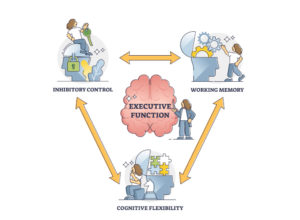Executive functioning refers to higher-level thinking, that allows children to successfully organize, sequence, and accomplish everyday tasks. It is a combination of 8 skills (working memory, flexibility, self-control, impulse control, self-monitoring, planning and prioritizing, task initiation, and organization) controlled and managed by the frontal lobe portion of the brain. Children are not born with these skills but have the potential to develop them as they grow and mature. Executive functioning skills can be facilitated through the establishment of routines, by modeling appropriate social behavior, and by creating and maintaining supportive, reliable relationships. Children are able to exercise their developing skills through activities that allow for creative play and social connections in order to teach them how to cope with stress and provide opportunities for self-directed activity.

Strong executive function is critical to successfully navigating the complex adult world. Although executive function peaks in the 20s and 30s, researchers at Harvard found that the sharpest rate of growth occurs from birth through age 10, with a dramatic spike between the ages of 3 and 5.
Signs of Executive Functioning Deficits Include:
- Disorganization (i.e. may forget to hand in school assignments or prioritize tasks with calendars).
- Struggle with time management.
- Difficulty with open-ended tasks, including assignments with little direction, or cannot switch from the planning phase of a project to its implementation.
- Difficulty starting tasks independently. For example, one may not know the length of an appropriate break before beginning homework after school.
- Unable to complete tasks efficiently.
- Struggle to review schoolwork without direction or guidance.
- Have rigid routines and dislike change.
- Become easily frustrated or intolerant of criticism
- Forget rules easily. Display difficulty memorizing or retrieving items from memory.
- Appear impulsive, have uncontrolled impulses, or have an inability to manage emotions.
Ways to Promote Self Regulation and Executive Functioning Skills:
- Provide a visual guide for routine and rules at home.
- Make expectations clear and concise; talk about what happened if expectations are not being met.
- Provide simple (1 or 2 steps) directions when giving instructions.
- Encourage and praise hard work and persistence.
- Use first/then statements i.e. “First we put the toys away, then we can have a snack.”
- Model how to calm down or take deep breaths when upset.
- Model healthy living and safe choices.
- Develop Family Rituals that provide time to reflect and share thoughts, feelings, and experiences (i.e. Highs and lows from the day over dinner, 3 best parts of the day on the drive home, marking off days on a calendar to look forward to a family outing).
- Implement sensory strategies for calming: use of essential oils, weighted blankets, calm music, dim lighting.
- Allow for opportunities for heavy work for calming: wall push-ups, pushing/pulling/carrying heavy objects, digging in the sand, “animal walks,” deep pressure/joint compression/massage, etc. (please consult with an occupational therapist on appropriate strategies)
- Review social stories (books on various emotions and positive social interactions) to help children understand their emotions and coping mechanisms.
- Use visual reminders to help children organize everyday tasks (planners, calendars, task charts, etc.)
- Use timers for breaks, time management, and attention to a task.
Understood.com has wonderful resources and additional strategies to try at home: https://www.understood.org/en/learning-attention-issues/child-learning-disabilities/executive-functioning-issues/executive-functioning-issues-strategies-you-can-try-at-home
Leave Your Reply
You must be logged in to post a comment.




